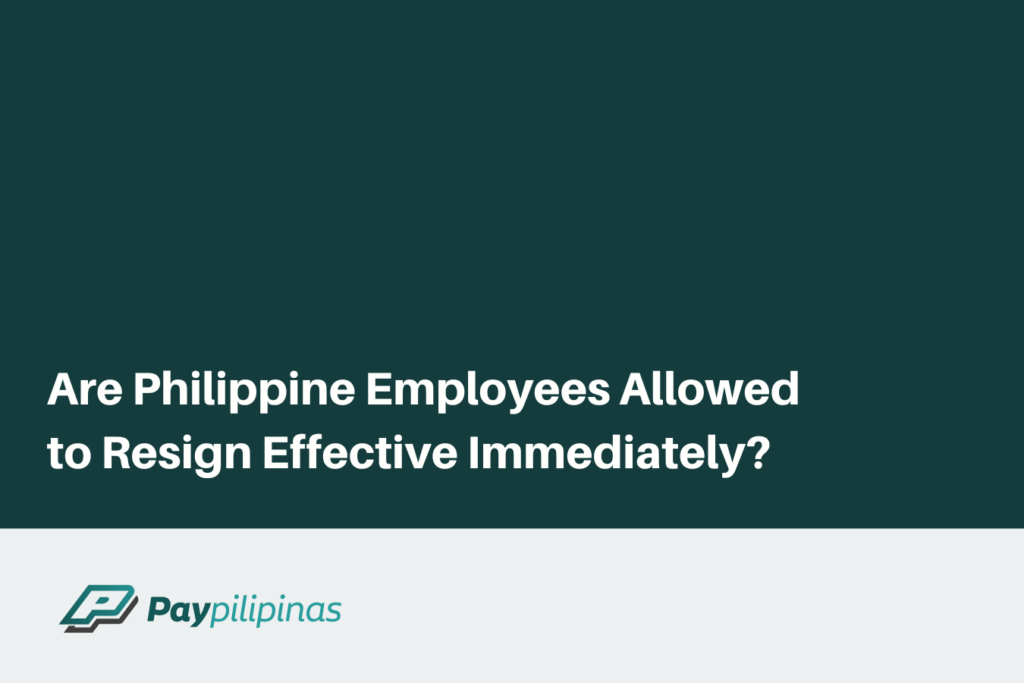
In the Philippines, employees are generally required to give a 30-day notice before resigning from their employment. This notice period allows the employer to make necessary arrangements and find a suitable replacement for the resigning employee. However, there are certain circumstances where an employee may immediately resign without the need for a notice period.
Under Article 300 of the Labor Code of the Philippines, an employee may resign effective immediately. However, they must meet the following just causes:
- Employer or his representative’s serious insult on the honor and person of the employee
- The inhuman and unbearable treatment accorded to the employee by the employer or his representative
These just causes provide grounds for an employee to resign effective immediately without the need for a 30-day notice. Moreover, resigning without just cause as outlined in the Labor Code may have legal implications. Furthermore, this could potentially result in liability for damages.
In summary,employees are generally required to give a 30-day notice before resigning. However, there are specific just causes that allow for immediate resignation without notice.
What happens if an employee resigns immediately?
Immediate resignation without just cause in the Philippines may have legal consequences for the employee. Here are some of the possible consequences:
- Liability for damages: If an employee resigns without just cause and without giving the required 30-day notice, the employer may make the employee liable for damages. The damages may include the cost of finding a replacement, training the replacement, and other expenses incurred due to the sudden vacancy.
- Loss of benefits: Employees who voluntarily resign from work are not entitled to separation pay. Separation pay applies only to those who were dismissed from service.
- Difficulty finding future employment: Resigning without just cause or without following the proper procedures outlined in the Labor Code may have negative implications on an employee’s future employment prospects.
It’s important for employees to follow the proper procedures when resigning from their employment to avoid any legal or financial consequences. Employees who are unsure about the proper procedures should consult with legal professionals or refer to the Labor Code for specific guidance in their particular situations.
What if employees resign effective immediately with just cause?
When an employee resigns immediately with just cause in the Philippines, they have certain legal rights. Here are the legal rights of an employee who resigns immediately with just cause:
- Termination without the need for a 30-day notice: An employee who resigns with just cause is not required to give a 30-day notice to the employer. They can terminate the employee-employer relationship immediately upon serving a written notice to the employer.
- Freedom from liability for damages: Unlike resigning without just cause, an employee who resigns with just cause is not liable for damages1. This means that the employer cannot hold the employee responsible for any costs or expenses incurred due to the sudden resignation.
- Right to withdraw resignation: In some cases, an employee who has submitted a resignation letter with just cause may be allowed to withdraw the resignation if the employer permits it. However, if the employer does not accept the withdrawal of resignation, the employee cannot claim illegal dismissal.
Employees who voluntarily resign from work, whether with just cause or without, are not entitled to separation pay. Separation pay applies only to those who were dismissed from service.
Overall, when an employee resigns immediately with just cause, they have the right to terminate the employment. This stands even without a notice period and are protected from liability for damages. However, it’s advisable for employees to consult with legal professionals. Alternatively, they may also refer to the Labor Code for specific guidance in their particular situations.
Related: